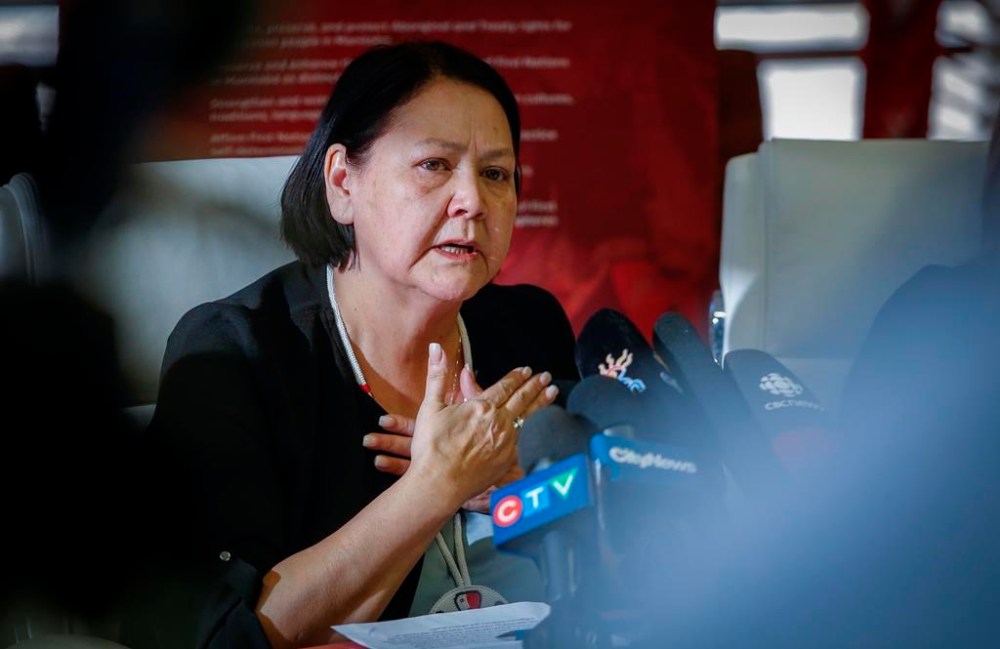Northern reserves demand $512-M all-season road
Advertisement
Read this article for free:
or
Already have an account? Log in here »
To continue reading, please subscribe:
Monthly Digital Subscription
$19 $0 for the first 4 weeks*
- Enjoy unlimited reading on winnipegfreepress.com
- Read the E-Edition, our digital replica newspaper
- Access News Break, our award-winning app
- Play interactive puzzles
*No charge for 4 weeks then billed as $19 every four weeks (new subscribers and qualified returning subscribers only). Cancel anytime.
Read unlimited articles for free today:
or
Already have an account? Log in here »
A fly-in northern First Nation says its winter road — a vital link used to transport food, fuel and supplies — has deteriorated to the point of it being an emergency.
As a result, St. Theresa Point First Nation has submitted a proposal to the provincial and federal governments for $512 million to build a 252-kilometre all-season road from the community to Berens River First Nation, which is connected to Winnipeg by an all-season road.
The proposed five-year project would link the communities of Island lake, including St. Theresa Point, Garden Hill and Wasagamack, where 15,000 people live, as well as Red Sucker Lake and Norway House Cree Nation.

Former Berens River First Nation Chief George Kemp said Wednesday the warm weather this winter has turned the ice road from his reserve to St. Theresa Point into “mush.”
“Looking at the forecast, basically, winter is over. There’s no way we’re going to get any -30 C (temperatures), by the looks of it, for two or three weeks, which is what we need,” said Kemp, who wrote the proposal for funding.
“So basically, we’re looking at the winter road system failing. Even though the highways department says it’s open… with this weather, they’re closed. You can’t haul on them, they’re mush. So nothing is moving.”
While this winter is on track to be one of the warmest in Manitoba history, Kemp said that First Nations have found it harder and harder to build ice roads over the past decade, as the planet has slowly warmed as a result of climate change.
“(The government) keeps saying, ‘We’ve got to do something about climate change.’ Well, when? It’s here. You’re saying it’s coming, we’re saying it’s here,” he said.
“We’ve got to act, because our communities are in peril now. That’s the impact of climate change. Ice roads are becoming a thing of the past.”–George Kemp
“We’ve got to act, because our communities are in peril now. That’s the impact of climate change. Ice roads are becoming a thing of the past.”
The proposal suggests the funding be granted in a social impact bond model, which would give both First Nations control of the project. They say they would build the road more affordably and in a shorter time frame than what the province could do.
The pitch comes after the authority responsible for the $3 billion East Side Road project, which sought to build a 1,000 kilometre all-season road linking remote communities up the east side of Lake Winnipeg, was dissolved by the PC government in 2016. Manitoba’s auditor general later concluded the project was financially and structurally mismanaged.
The East Side Road Authority was created in 2009 by the NDP government.
While the project was paused in 2016, a 155-kilometre all-season road on the east side of Lake Winnipeg from Provincial Road 304, east of Manigotagan, to Berens River was completed in 2017.
St. Theresa Point Chief Raymond Flett called the social impact model a necessary step in completing the project.
“This is not a negotiable proposal, it’s a demand for the governments to acknowledge their responsibility to the people they serve,” said Flett said in a statement.
“This is not a negotiable proposal, it’s a demand for the governments to acknowledge their responsibility to the people they serve.”–Raymond Flett
“The social impact bond model is not just a cost-effective plan, it’s a call for a profound and immediate change in improving our citizens’ lives.”
Indigenous Economic Development Minister Ian Bushie said he received the report.
“Our government will be reviewing the proposal we received from St Theresa Point and we look forward to continued collaboration and consultation on this issue,” he said in an email.
Building an all-season road wouldn’t just be a way to get goods transported in warmer temperatures, but a method of mitigating social issues, including the high cost of food and access to health care, as well as mental health concerns that affect people in remote communities that would be served by the road.
“Usually, when we go to government for something like this, they say ‘We’ve got to do studies, we’ve got to do plans.’ We’re sick and tired of studies and plans, we’re studied to death all the time. We know the land, we know what to do, we know where to go with this road. We don’t need a damn study,” he said.
“We just want to build it because people’s lives are depending on this. This is coming into a crisis and a state of emergency kind of situation.”
malak. abas@freepress.mb.ca

Malak Abas
Reporter
Malak Abas is a city reporter at the Free Press. Born and raised in Winnipeg’s North End, she led the campus paper at the University of Manitoba before joining the Free Press in 2020. Read more about Malak.
Every piece of reporting Malak produces is reviewed by an editing team before it is posted online or published in print — part of the Free Press‘s tradition, since 1872, of producing reliable independent journalism. Read more about Free Press’s history and mandate, and learn how our newsroom operates.
Our newsroom depends on a growing audience of readers to power our journalism. If you are not a paid reader, please consider becoming a subscriber.
Our newsroom depends on its audience of readers to power our journalism. Thank you for your support.




